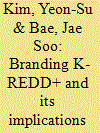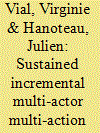|
|
|
Sort Order |
|
|
|
Items / Page
|
|
|
|
|
|
|
| Srl | Item |
| 1 |
ID:
165145


|
|
|
|
|
| Summary/Abstract |
The need for new and stronger middle power diplomacy is growing as global challenges are increasingly governed by various horizontal inter- and trans-national networks. Climate change is one of the most complex and urgent global challenges that require collective action, and it is an issue for which more middle power leadership is greatly needed. The Republic of Korea (ROK) has been successful in becoming a primary actor in green growth governance, and its success has been attributed to its strategic middlepowermanship, integrating both material and ideational contents. Reducing emissions from deforestation and forest degradation (REDD+) in tropical developing countries has been lauded as an immediate and effective solution to mitigate climate change. ROK's unique history of forest transition before rapid economic growth highlights the fact that improving forest management is possible even with imperfect governance, rapid population growth, and low economic development. The lessons learned from ROK's forest transition can be developed as a distinct contribution to the international effort to address forest-related impacts on climate change, and offer an important opportunity for ROK to play a constructive role and achieve enhanced stature within the international community.
|
|
|
|
|
|
|
|
|
|
|
|
|
|
|
|
| 2 |
ID:
165142


|
|
|
|
|
| Summary/Abstract |
This article contributes to the discussion about China's divisive influence on the Association of Southeast Asian Nations (ASEAN). It argues that recent China–ASEAN relations are based on Beijing's successful implementation of a dual strategy of coercion and inducement. The effectiveness of this strategy is tested against the South China Sea disputes – the issue that lies in the core of regional security and a key platform of power display. The article outlines Beijing's recent interaction with individual ASEAN member-states and its implications for the regional multilateral diplomacy. While by no means identical, Beijing's dual strategy of coercion and inducement with individual ASEAN states have resulted in an effective abuse of the ASEAN consensus principle – a tactic often referred to as ‘divide and rule’. Consequently, the group's internal discord has further eroded and affected the institutional confidence of ASEAN. This article draws attention to the psychological effect of coercion as a perception of punishment, and inducement as a perception of reward.
|
|
|
|
|
|
|
|
|
|
|
|
|
|
|
|
| 3 |
ID:
165146


|
|
|
|
|
| Summary/Abstract |
Small states throughout the Asia-Pacific are confronted by a growing dilemma over how to balance their traditional security ties with the US and rapidly growing trade with China. This gives Washington and Beijing potential leverage over small states to use within their competition with one another. This article explores the implications of this for New Zealand – a small South Pacific state that prides itself on maintaining an independent foreign policy. Situated within the small state literature, it utilises a material-based strategic triangle to illustrate the fundamental facets of New Zealand's position. Relatedly, the article examines how Wellington has managed its burgeoning relations with China and the US over the past decade and critically considers New Zealand's independent foreign policy. It finds that New Zealand has adopted a mixed set of strategies to manage its position between the US and China, closely aligning itself with Washington while remaining nonaligned on some key security issues in the Asia-Pacific region. New Zealand has certainly not opted for neutrality. The article concludes that New Zealand and other small states must remain vigilant, may want to consider alternative strategies of alignment, and outlines a number of areas where additional research could prove fruitful.
|
|
|
|
|
|
|
|
|
|
|
|
|
|
|
|
| 4 |
ID:
165143


|
|
|
|
|
| Summary/Abstract |
Since 2011, Myanmar has undertaken a series of domestic and foreign policy reforms, including democratisation and peacebuilding, before and after the watershed November 2015 elections in the country. These reform processes have called into question whether China, which has been Myanmar's dominant great power neighbour throughout the previous era of military government in the country formerly known as Burma, would find its strategic position eroding as Myanmar further opens to the international community. However, the concept of China ‘losing’ diplomatic ground to other actors, including the West, in Myanmar implies a zero-sum game that does not adequately address Beijing's still-formidable geostrategic presence vis-à-vis its southern neighbour. China has now started to implement a more multi-faceted, ‘resilience network’-building approach to maintaining its special status in Myanmar's foreign policy, a situation which will persist as Myanmar continues its uncertain path towards further reform.
|
|
|
|
|
|
|
|
|
|
|
|
|
|
|
|
| 5 |
ID:
165141


|
|
|
|
|
| Summary/Abstract |
Russia's growing energy cooperation with China is central to several of Moscow's top foreign-policy objectives. Analyzing what drives Russia's energy diplomacy with China can therefore shed important light on the dynamics of Russian foreign policy-making. We go beyond other recent studies of this topic by examining the role of domestic political influences and the countries’ bilateral interactions. We show that personalist elements influence both Russia's policy-making and its diplomacy with China. The personalism has made it hard for Russia to coordinate the relevant decision-making institutions and get the most from its energy strength. The economic gains from recent energy deals, particularly to Russia's Far East, have been less than expected, and Russia has met only limited success in achieving its foreign-policy priorities in the Asia-Pacific region. Moving forward, Russia must further institutionalize its decision-making process, limit the role of personalism, and better coordinate the activities of its energy firms with the goals of its central agencies and local governments.
|
|
|
|
|
|
|
|
|
|
|
|
|
|
|
|
| 6 |
ID:
165144


|
|
|
|
|
| Summary/Abstract |
Since the end of the East–West divide in the 1990s, the world has slowly lost its US-based unipolarity to globalisation, and a shift towards East Asia. This phenomenon has given more space to middle powers and furthered the embeddedness of the political, economic, and cultural spheres into the dynamics of social structures. It is highly visible when observed from the digital communication standpoint, which has become pervasive. In this context, the study of international power has moved towards the concept of soft power, which remains a fuzzy concept concerning ‘who’ and ‘what’. We define power as a continuum, in which various types of public and private actors carry out different types of coercive to cooptive actions in various but embedded spheres. We propose an empirically tractable conceptual framework that we use as a tool to analyse soft power within a hard-to-soft power spectrum, in which the articulation, dynamics and incremental nature of soft power become observable. We illustrate our point with the case study of South Korean power in Indonesia in the twenty-first century and draw conceptual as well as practical conclusions.
|
|
|
|
|
|
|
|
|
|
|
|
|
|
|
|
| 7 |
ID:
165147


|
|
|
|
|
| Summary/Abstract |
Military obsolescence affects the capability of all militaries as it relates to serviceability and performance when countering potential opponents, and more specifically in the case of developing countries lacking strong indigenous defence industries. The gradual nature of this military concern has not been studied systematically, in contrast to military modernisation. This paper presents a synthetic framework composed of several indicators to examine military obsolescence. Vietnam has been selected for the application of the framework for its large number of Cold War legacies and the strategic pressure from China. Hanoi's ageing assets would undermine its position vis-à-vis Beijing, and its defence investment policies face the dilemma of choosing to spend more on naval and aerial power, or ameliorating its army which is technologically lacking compared to its Chinese counterpart.
|
|
|
|
|
|
|
|
|
|
|
|
|
|
|
|
|
|
|
|
|